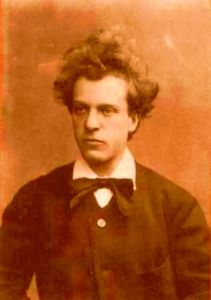This Week in Classical Music: August 1, 2022. Hans Rott, Leonel Power. Today is the birthday of the Austrian composer Hans Rott; he was born in Braunhirschengrund, a suburb of  Vienna, in 1858. A composer of obvious talent who lived a short and tragic life, he in a way anticipated Mahler. Both Bruckner and Mahler recognized him as a major talent. We wrote an entry about Rott, you can read it here. It seems that we’re not the only ones fascinated by Rott: his Symphony no. 1, the only one he completed, and some of his other works are being recorded on a regular basis. In the past two years a two-volume CD set was issued by the Capriccio label; it features the Gürzenich Orchestra Cologne, one of the two major Cologne orchestras, under the direction of Christopher Ward and contains practically all of Rott’s symphonic music.
Vienna, in 1858. A composer of obvious talent who lived a short and tragic life, he in a way anticipated Mahler. Both Bruckner and Mahler recognized him as a major talent. We wrote an entry about Rott, you can read it here. It seems that we’re not the only ones fascinated by Rott: his Symphony no. 1, the only one he completed, and some of his other works are being recorded on a regular basis. In the past two years a two-volume CD set was issued by the Capriccio label; it features the Gürzenich Orchestra Cologne, one of the two major Cologne orchestras, under the direction of Christopher Ward and contains practically all of Rott’s symphonic music.
This week is also a putative anniversary of Guillaume Dufay, who, according to some research was born on August 5th of 1397. We’ve written about this very important composer on a number of occasions (for example, here about his extensive travels around Europe). We’ve also written about his contemporary, another Franco-Flemish composer, Gilles Binchois (Dufay and Binchois were born about 25 miles from each other, the former in Beersel, the latter in Mons, both in modern day Belgium). Antoine Busnois ,who was a generation younger, is usually considered the third of the most consequential Franco-Flemish composers of the mid-15th century. The Franco-Flemish school was one of the two dominant music schools of the time, the other being developed in England (notice the absence of the Italians). Two English composers overshadowed the rest in the flourishing music scene: John Dunstaple and Leonel Power. Up till now we were amiss in not addressing Power’s life and music. Power was older than either Dunstaple or Dufay: he was born sometime between 1370 and 1385. There are few records of his life. Power’s name is first mentioned on a list of clerks of the household chapel of Thomas, Duke of Clarence: he’s listed as an instructor of the choristers (Thomas was a brother of Henry V, the great warrior-king of England immortalized by Shakespeare). In 1423 Power was mentioned as being admitted to the fraternity of Christ Church, Canterbury (the Canterbury cathedral). In 1439 Power became master of the choir at the cathedral. Not much else is known about his life. He died at Canterbury on June 5th of 1445. About 40 pieces of music are attributed to Power, many of them represented in the Old Hall Manuscript, a unique document compiled in the first half of the 15th century. We know of about eight of his masses, although two of them could have been written by Dunstaple: the styles of the two composers were similar, what the French called Contenance angloise, or English manner. Power was one of the first composers to create a unified mass cycle. To demonstrate Power’s music, here are two mass sections: Gloria and Credo. Both are performed by the Hilliard Ensemble.
| Source: | https://www.classicalconnect.com/node/13758 |
| Website: | Classical Connect |